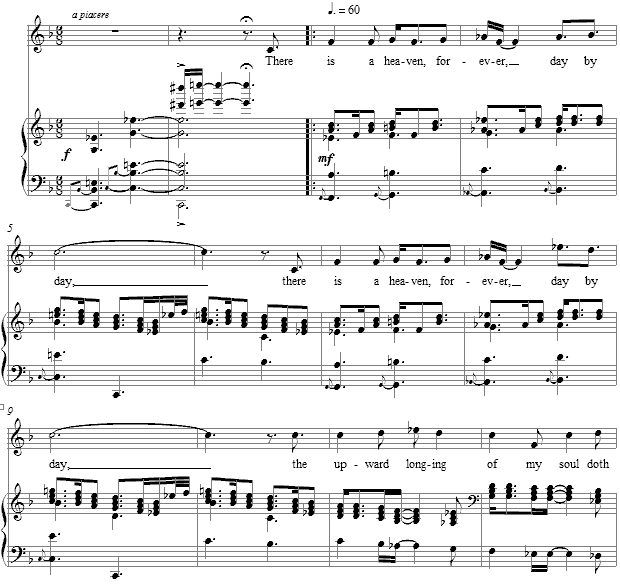Music and Texts of GARY BACHLUND
Vocal Music | Piano | Organ | Chamber Music | Orchestral | Articles and Commentary | Poems and Stories | Miscellany | FAQs
Theology - (2008)
Paul Laurence Dunbar
for medium or high voice and piano
There is a heaven, for ever, day by day,
The upward longing of my soul doth tell me so.
There is a hell, I'm quite as sure; for pray
If there were not, where would my neighbours go? [ 1 ][ 2 pages, circa 1' 10" ]
Paul Laurence Dunbar
Paul Laurence Dunbar, born in Dayton, Ohio in 1872, was perhaps the first African-American author to attain international recognition. Dunbar was known for his use of dialect [ 2 ], but was also an accomplished poet and novelist in standard English. At age seventeen he published his own newspaper, the Dayton Tattler, printed by his high school classmate and friend, Orville Wright. Wilbur and Orville Wright, who had a small printing plant.
The Wright Brothers invested in Dunbar's newspaper which targeted the black community. He kept a lifelong friendship with the Wrights, and was also associated with Frederick Douglass and Booker T. Washington. Dunbar's first book of poems, Oak and Ivy, was published in 1893, and attracted the attention of James Whitcomb Riley, the popular "Hoosier Poet;" Riley and Dunbar wrote poems in both standard English and dialect.. The book contained Dunbar's first dialect poem, "A Banjo Song." Dunbar met the black composer Samuel Coleridge-Taylor who set some of his poems to music and who was influenced by Dunbar to use African and American Negro songs and tunes in future work.
Dunbar published a dozen books of poetry, four books of short stories, five novels, a play and music during his career. He died in Dayton in 1906. His work appeared in Harper's Weekly, the Saturday Evening Post, the Denver Post, Current Literature and a number of other publications.
The poem is a simple four line form in the rhyme scheme, ABAB. I took the form apart using the first line as a repeat in the musical setting, such that the second line ends the first verse. The second verse of the song, begins properly with the third line, but the second line and a conflation of "heaven" and "hell" ends the song itself, a quite ordinary set of four measure phrases with a small ending tag.
The score for Theology is available as a free PDF download, though any major commercial performance or recording of the work is prohibited without prior arrangement with the composer. Click on the graphic below for this piano-vocal score.
NOTES
[ 1 ] Dunbar uses the British spelling, by today's standards, though in the score I employed the American spelling, "neighbor," seeing them as equivalent in terms of performance, for song is an acoustic art while poetry is both visual and aural.
[ 2 ] Mid twentieth century criticism foolishly adopted the political correctness of that time and complained of "the dialect," as well as most recently holding mock funerals for the word, "nigger." This was of course sheer politics and means nothing to the long term history of the written arts. For more on "the dialect," please see notes under my setting of James Weldon Johnson's Sence You Went Away.

